Frequent persons on Kazakhstan's street signs
countries
54 names / 767 streets
Abai Qunanbaiuly
 68
Ibrahim (Abai) Qunanbaiūly was a Kazakh poet, composer and Hanafi Maturidi theologian philosopher. He was also a cultural reformer toward European and Russian cultures on the basis of enlightened...
68
Ibrahim (Abai) Qunanbaiūly was a Kazakh poet, composer and Hanafi Maturidi theologian philosopher. He was also a cultural reformer toward European and Russian cultures on the basis of enlightened...
Bauyrzhan Momyshuly
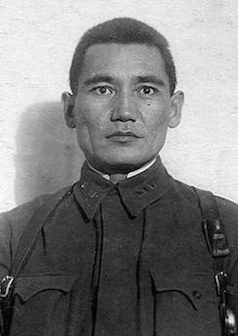 32
Bauyrzhan Momyshuly, also spelled Baurjan Momish-Uli was a Kazakh-Soviet military officer and author, posthumously awarded with the titles Hero of the Soviet Union and People's Hero of Kazakhstan.
32
Bauyrzhan Momyshuly, also spelled Baurjan Momish-Uli was a Kazakh-Soviet military officer and author, posthumously awarded with the titles Hero of the Soviet Union and People's Hero of Kazakhstan.
Yuri Gagarin
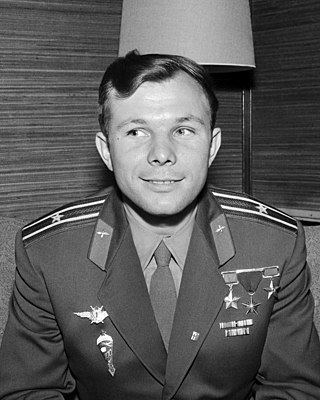 32
Yuri Alekseyevich Gagarin was a Soviet pilot and cosmonaut who, aboard the first successful crewed spaceflight, became the first human to journey into outer space. Travelling on Vostok 1, Gagarin...
32
Yuri Alekseyevich Gagarin was a Soviet pilot and cosmonaut who, aboard the first successful crewed spaceflight, became the first human to journey into outer space. Travelling on Vostok 1, Gagarin...
Vladimir Lenin
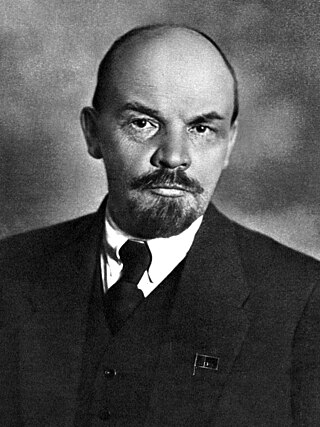 27
Vladimir Ilyich Ulyanov, better known as Vladimir Lenin, was a Russian revolutionary, Soviet politician, and political theorist who was the founder and first leader of the Russian Soviet Federative...
27
Vladimir Ilyich Ulyanov, better known as Vladimir Lenin, was a Russian revolutionary, Soviet politician, and political theorist who was the founder and first leader of the Russian Soviet Federative...
Aliya Moldagulova
 27
Aliya Nurmuhametqyzy Moldagulova was a Kazakh woman sniper of the Red Army during World War II who killed over 30 Nazi soldiers. After dying of wounds sustained in battle on 14 January 1944, she was...
27
Aliya Nurmuhametqyzy Moldagulova was a Kazakh woman sniper of the Red Army during World War II who killed over 30 Nazi soldiers. After dying of wounds sustained in battle on 14 January 1944, she was...
Kanysh Satbayev
 26
Kanysh Imantayuli Satbayev was a Kazakh professor, geologist and one of the founders of Soviet metallogeny and the principal advocate and first president of Kazakhstan Academy of Sciences.
26
Kanysh Imantayuli Satbayev was a Kazakh professor, geologist and one of the founders of Soviet metallogeny and the principal advocate and first president of Kazakhstan Academy of Sciences.
Saken Seifullin
 22
Saken Seifullin was a pioneer of modern Kazakh literature, poet and writer, and national activist. He was the founder and first head of the Union of Writers of Kazakhstan, he was the author of...
22
Saken Seifullin was a pioneer of modern Kazakh literature, poet and writer, and national activist. He was the founder and first head of the Union of Writers of Kazakhstan, he was the author of...
Alexander Pushkin
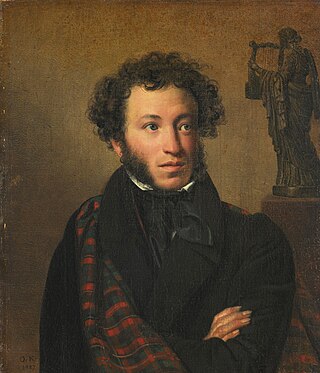 22
Alexander Sergeyevich Pushkin was a Russian poet, playwright, and novelist of the Romantic era. He is considered by many to be the greatest Russian poet, as well as the founder of modern Russian...
22
Alexander Sergeyevich Pushkin was a Russian poet, playwright, and novelist of the Romantic era. He is considered by many to be the greatest Russian poet, as well as the founder of modern Russian...
Амангельды Иманов
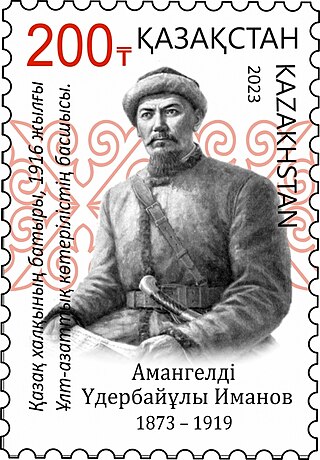 21
Амангельды́ Удербайулы́ Има́нов — один из лидеров Среднеазиатского восстания 1916 года против имперских властей, участник установления Советской власти в Казахстане, участник гражданской войны, член...
21
Амангельды́ Удербайулы́ Има́нов — один из лидеров Среднеазиатского восстания 1916 года против имперских властей, участник установления Советской власти в Казахстане, участник гражданской войны, член...
Айтеке-би
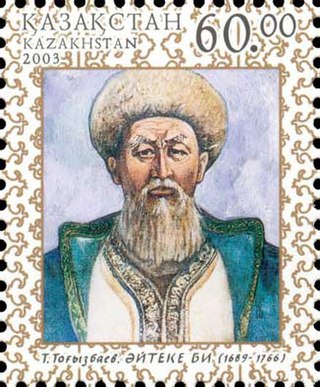 21
Айтеке-би Байбекулы, подлинное имя Айтык — великий казахский бий, оратор. Внес большой вклад в объединение казахского народа.
21
Айтеке-би Байбекулы, подлинное имя Айтык — великий казахский бий, оратор. Внес большой вклад в объединение казахского народа.
Mukhtar Auezov
 20
Mukhtar Omarkhanuli Auezov was a Kazakh writer, a social activist, a Doctor of Philology, and an honored academician of the Soviet Union (1946).
20
Mukhtar Omarkhanuli Auezov was a Kazakh writer, a social activist, a Doctor of Philology, and an honored academician of the Soviet Union (1946).
Zhambyl Zhabayuly
 20
Zhambyl Zhabaev was a Soviet and Kazakh traditional folksinger.
20
Zhambyl Zhabaev was a Soviet and Kazakh traditional folksinger.
Shoqan Walikhanov
 18
Shokan Shyngysuly Walikhanov, given name Mukhammed Kanafiya was a Kazakh scholar, ethnographer, historian and participant in the Great Game. His reputation "as the father of modern Kazakh history and...
18
Shokan Shyngysuly Walikhanov, given name Mukhammed Kanafiya was a Kazakh scholar, ethnographer, historian and participant in the Great Game. His reputation "as the father of modern Kazakh history and...
Ablai Khan
 18
Wāli-ūllah Abū'l-Mansūr Khan, better known as Abylai Khan or Ablai Khan was Khan of the Middle Jüz was the last independent Kazakh Khan of the Kazakh Khanate before the Khanate was absorbed into the...
18
Wāli-ūllah Abū'l-Mansūr Khan, better known as Abylai Khan or Ablai Khan was Khan of the Middle Jüz was the last independent Kazakh Khan of the Kazakh Khanate before the Khanate was absorbed into the...
Mikhail Lermontov
 18
Mikhail Yuryevich Lermontov was a Russian Romantic writer, poet and painter, sometimes called "the poet of the Caucasus", the most important Russian poet after Alexander Pushkin's death in 1837 and...
18
Mikhail Yuryevich Lermontov was a Russian Romantic writer, poet and painter, sometimes called "the poet of the Caucasus", the most important Russian poet after Alexander Pushkin's death in 1837 and...
Turar Ryskulov
 17
Turar Ryskululy Ryskulov was a Soviet politician, the chairman of the Central Electoral Committee of the Turkestan Autonomous Soviet Socialist Republic.
17
Turar Ryskululy Ryskulov was a Soviet politician, the chairman of the Central Electoral Committee of the Turkestan Autonomous Soviet Socialist Republic.
Töle Biy
 16
Töle Biy, or Töle Älibekūly was the head biy of the Kazakh senior juz, as well as an author, orator, poet, politician and a public figure. He was born in Jaysan in what is now Shuy district, Jambyl...
16
Töle Biy, or Töle Älibekūly was the head biy of the Kazakh senior juz, as well as an author, orator, poet, politician and a public figure. He was born in Jaysan in what is now Shuy district, Jambyl...
Al-Farabi
 16
Abu Nasr Muhammad al-Farabi, known in the Latin West as Alpharabius, was an early Islamic philosopher and music theorist. He has been designated as "Father of Islamic Neoplatonism", and the "Founder...
16
Abu Nasr Muhammad al-Farabi, known in the Latin West as Alpharabius, was an early Islamic philosopher and music theorist. He has been designated as "Father of Islamic Neoplatonism", and the "Founder...
Nikolai Gogol
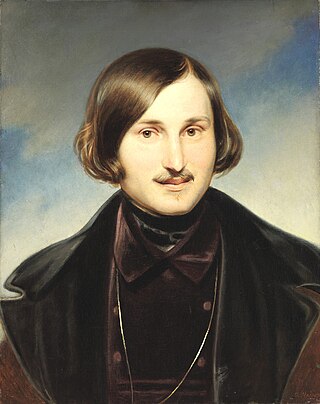 14
Nikolai Vasilyevich Gogol was a Russian novelist, short story writer, and playwright of Ukrainian origin.
14
Nikolai Vasilyevich Gogol was a Russian novelist, short story writer, and playwright of Ukrainian origin.
Manshuk Mametova
 14
Manshuk Zhiengalikyzy Mametova was a machine gunner of the 100th Rifle Brigade in the 21st Guards Rifle Division of the 3rd Shock Army on the Kalinin Front during the Second World War. She became the...
14
Manshuk Zhiengalikyzy Mametova was a machine gunner of the 100th Rifle Brigade in the 21st Guards Rifle Division of the 3rd Shock Army on the Kalinin Front during the Second World War. She became the...
Ahmet Baitursynuly
 13
Ahmet Baitursynuly was a Kazakh intellectual who worked in the fields of politics, poetry, linguistics and education.
13
Ahmet Baitursynuly was a Kazakh intellectual who worked in the fields of politics, poetry, linguistics and education.
Казыбек-би
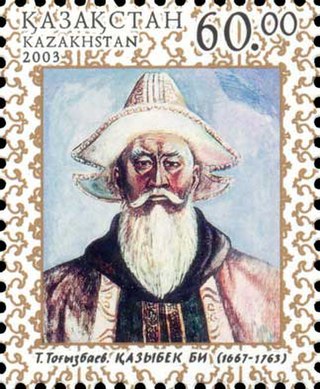 13
Казыбек «Каз Дауысты» Кельдибекулы — великий казахский бий, великий оратор, общественный деятель и посол.
13
Казыбек «Каз Дауысты» Кельдибекулы — великий казахский бий, великий оратор, общественный деятель и посол.
Ybyrai Altynsarin
 13
Ybyrai (Ibrahim) Altynsarin was a major figure in pre-Soviet Kazakh history. He was the most prominent Kazakh educator of the late 19th century, during the period of Russian colonization of and...
13
Ybyrai (Ibrahim) Altynsarin was a major figure in pre-Soviet Kazakh history. He was the most prominent Kazakh educator of the late 19th century, during the period of Russian colonization of and...
Mikhail Lomonosov
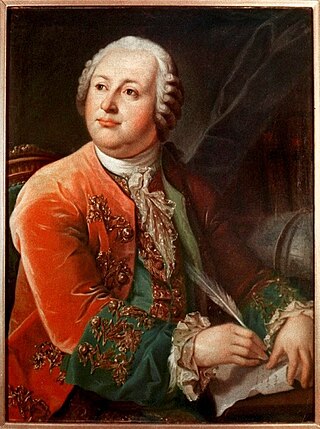 13
Mikhail Vasilyevich Lomonosov was a Russian polymath, scientist and writer, who made important contributions to literature, education, and science. Among his discoveries were the atmosphere of Venus...
13
Mikhail Vasilyevich Lomonosov was a Russian polymath, scientist and writer, who made important contributions to literature, education, and science. Among his discoveries were the atmosphere of Venus...
Ivan Panfilov
 12
Ivan Vasilyevich Panfilov was a Soviet general and a posthumous Hero of the Soviet Union, known for his command of the 316th Rifle Division during the defense of Moscow at the Second World War.
12
Ivan Vasilyevich Panfilov was a Soviet general and a posthumous Hero of the Soviet Union, known for his command of the 316th Rifle Division during the defense of Moscow at the Second World War.
Кабанбай-батыр
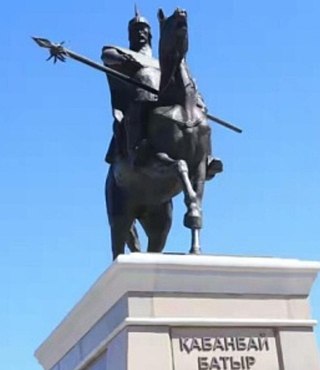 12
Кара́кере́й Кабанба́й-баты́р — казахский батыр, полководец казахско-джунгарской войны.
12
Кара́кере́й Кабанба́й-баты́р — казахский батыр, полководец казахско-джунгарской войны.
Dinmukhamed Kunaev
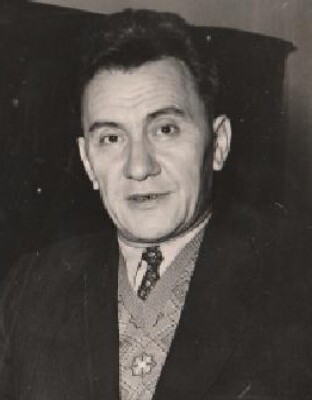 11
Dinmukhamed Akhmetuly "Dimash" Kunaev was a Kazakh Soviet communist politician who served as the First Secretary of the Communist Party of the Kazakh SSR.
11
Dinmukhamed Akhmetuly "Dimash" Kunaev was a Kazakh Soviet communist politician who served as the First Secretary of the Communist Party of the Kazakh SSR.
Mikhail Frunze
 11
Mikhail Vasilyevich Frunze was a Soviet revolutionary, politician, army officer and military theorist. Born to a Bessarabian father and a Russian mother in Russian Turkestan, Frunze attended the...
11
Mikhail Vasilyevich Frunze was a Soviet revolutionary, politician, army officer and military theorist. Born to a Bessarabian father and a Russian mother in Russian Turkestan, Frunze attended the...
Kurmangazy Sagyrbaev
 11
Kurmangazy Sagyrbaev was a Kazakh composer, instrumentalist, and folk artist. He influenced Kazakh musical culture. He was born in 1818 in the Bukey Horde. He is buried in the Astrakhan region of...
11
Kurmangazy Sagyrbaev was a Kazakh composer, instrumentalist, and folk artist. He influenced Kazakh musical culture. He was born in 1818 in the Bukey Horde. He is buried in the Astrakhan region of...
Gherman Titov
 11
Gherman Stepanovich Titov was a Soviet cosmonaut who, on 6 August 1961, became the second human to orbit the Earth, aboard Vostok 2, preceded by Yuri Gagarin on Vostok 1. He was the fourth person in...
11
Gherman Stepanovich Titov was a Soviet cosmonaut who, on 6 August 1961, became the second human to orbit the Earth, aboard Vostok 2, preceded by Yuri Gagarin on Vostok 1. He was the fourth person in...
Valery Chkalov
 10
Valery Pavlovich Chkalov was a test pilot awarded the title Hero of the Soviet Union (1936).
10
Valery Pavlovich Chkalov was a test pilot awarded the title Hero of the Soviet Union (1936).
Anton Chekhov
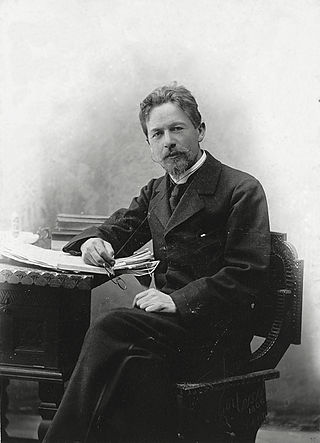 10
Anton Pavlovich Chekhov was a Russian playwright and physician. His career as a playwright produced four classics, and his best short stories are held in high esteem by writers and critics. Along...
10
Anton Pavlovich Chekhov was a Russian playwright and physician. His career as a playwright produced four classics, and his best short stories are held in high esteem by writers and critics. Along...
Vladimir Mayakovsky
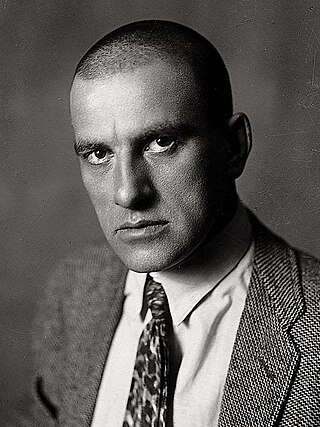 10
Vladimir Vladimirovich Mayakovsky was a Russian and Soviet poet, playwright, artist, and actor.
10
Vladimir Vladimirovich Mayakovsky was a Russian and Soviet poet, playwright, artist, and actor.
Taras Shevchenko
 9
Taras Hryhorovych Shevchenko was a Ukrainian poet, writer, artist, public and political figure, folklorist and ethnographer. He was a fellow of the Imperial Academy of Arts and a member of the...
9
Taras Hryhorovych Shevchenko was a Ukrainian poet, writer, artist, public and political figure, folklorist and ethnographer. He was a fellow of the Imperial Academy of Arts and a member of the...
Nursultan Nazarbayev
 9
Nursultan Abishuly Nazarbayev is a Kazakh politician and military officer who served as the first President of Kazakhstan, from the country’s independence in 1991 until his formal resignation in...
9
Nursultan Abishuly Nazarbayev is a Kazakh politician and military officer who served as the first President of Kazakhstan, from the country’s independence in 1991 until his formal resignation in...
Magzhan Zhumabayev
 9
Magzhan Zhumabayev, was a Kazakh poet and writer who revolutionized the Kazakh language.
9
Magzhan Zhumabayev, was a Kazakh poet and writer who revolutionized the Kazakh language.
Nikolay Nekrasov
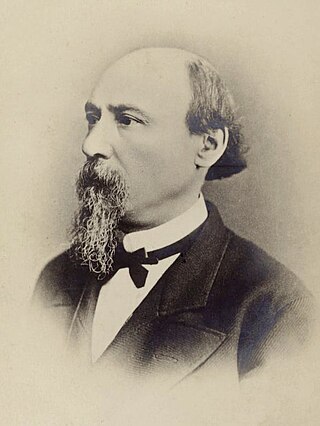 9
Nikolay Alexeyevich Nekrasov was a Russian poet, writer, critic and publisher, whose deeply compassionate poems about the Russian peasantry made him a hero of liberal and radical circles in the...
9
Nikolay Alexeyevich Nekrasov was a Russian poet, writer, critic and publisher, whose deeply compassionate poems about the Russian peasantry made him a hero of liberal and radical circles in the...
Qairat Rysqulbekov
 9
Qairat Nogaibaiuly Rysqulbekov was a participant in the Jeltoqsan riot of 1986 that took place in Almaty, Kazakhstan. He later died in mysterious circumstances while held by the authorities. He was...
9
Qairat Nogaibaiuly Rysqulbekov was a participant in the Jeltoqsan riot of 1986 that took place in Almaty, Kazakhstan. He later died in mysterious circumstances while held by the authorities. He was...
Ivan Pavlov
 8
Ivan Petrovich Pavlov was a Russian and Soviet experimental neurologist and physiologist known for his discovery of classical conditioning through his experiments with dogs.
8
Ivan Petrovich Pavlov was a Russian and Soviet experimental neurologist and physiologist known for his discovery of classical conditioning through his experiments with dogs.
Mirjaqip Dulatuli
 8
Mirjaqyp Dulatuly (Kazakh: Міржақып Дулатұлы, Mırjaqyp Dulatūly; Russian: Миржакып Дулатов, also known as Mir Yakub Dulatov, was a Kazakh poet, writer and one of leaders of Kazakh nationalist Alash...
8
Mirjaqyp Dulatuly (Kazakh: Міржақып Дулатұлы, Mırjaqyp Dulatūly; Russian: Миржакып Дулатов, also known as Mir Yakub Dulatov, was a Kazakh poet, writer and one of leaders of Kazakh nationalist Alash...
Vasily Chapayev
 8
Vasily Ivanovich Chapayev or Chapaev was a Russian soldier and Red Army commander during the Russian Civil War.
8
Vasily Ivanovich Chapayev or Chapaev was a Russian soldier and Red Army commander during the Russian Civil War.
Alexander Ostrovsky
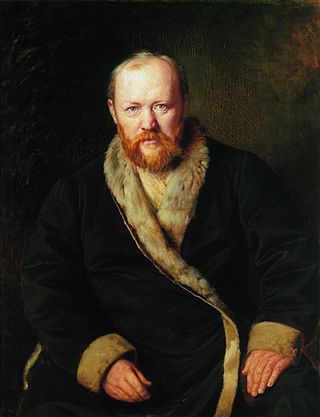 7
Alexander Nikolayevich Ostrovsky was a Russian playwright, generally considered the greatest representative of the Russian realistic period. The author of 47 original plays, Ostrovsky "almost...
7
Alexander Nikolayevich Ostrovsky was a Russian playwright, generally considered the greatest representative of the Russian realistic period. The author of 47 original plays, Ostrovsky "almost...
Ivan Michurin (biologist)
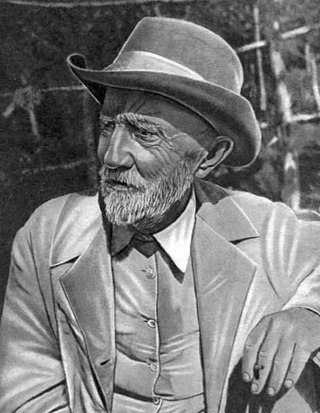 7
Ivan Vladimirovich Michurin was a Russian practitioner of selection to produce new types of crop plants, Honorable Member of the Soviet Academy of Sciences, and academician of the Lenin All-Union...
7
Ivan Vladimirovich Michurin was a Russian practitioner of selection to produce new types of crop plants, Honorable Member of the Soviet Academy of Sciences, and academician of the Lenin All-Union...
Ivan Krylov
 7
Ivan Andreyevich Krylov is Russia's best-known fabulist and probably the most epigrammatic of all Russian authors. Formerly a dramatist and journalist, he only discovered his true genre at the age of...
7
Ivan Andreyevich Krylov is Russia's best-known fabulist and probably the most epigrammatic of all Russian authors. Formerly a dramatist and journalist, he only discovered his true genre at the age of...
Lidiya Seifullina
 7
Lidiya Nikolaevna Seifullina was a Soviet journalist, playwright, novelist, and short story writer. Her short story "Virineia" serves as the basis for an opera by Sergei Slonimsky.
7
Lidiya Nikolaevna Seifullina was a Soviet journalist, playwright, novelist, and short story writer. Her short story "Virineia" serves as the basis for an opera by Sergei Slonimsky.
Mikhail Kalinin
 7
Mikhail Ivanovich Kalinin was a Soviet politician and Russian Old Bolshevik revolutionary. He served as head of state of the Russian Soviet Federative Socialist Republic and later of the Soviet Union...
7
Mikhail Ivanovich Kalinin was a Soviet politician and Russian Old Bolshevik revolutionary. He served as head of state of the Russian Soviet Federative Socialist Republic and later of the Soviet Union...
Бейімбет Жармағамбетұлы Майлин
 7
Бейімбет Жармағамбетұлы Майлы — қазақтың көрнекті жазушысы, ақыны, драмашысы, қазақ әдебиетін қалыптастырушылардың бірі.
7
Бейімбет Жармағамбетұлы Майлы — қазақтың көрнекті жазушысы, ақыны, драмашысы, қазақ әдебиетін қалыптастырушылардың бірі.
Leo Tolstoy
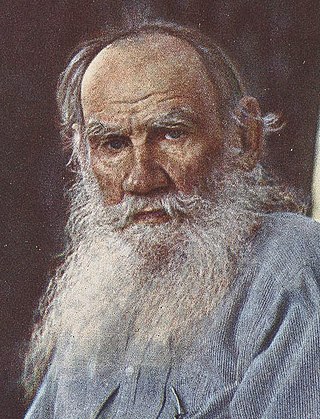 6
Count Lev Nikolayevich Tolstoy, usually referred to in English as Leo Tolstoy, was a Russian writer. He is regarded as one of the greatest and most influential authors of all time. He received...
6
Count Lev Nikolayevich Tolstoy, usually referred to in English as Leo Tolstoy, was a Russian writer. He is regarded as one of the greatest and most influential authors of all time. He received...
Fyodor Dostoevsky
 6
Fyodor Mikhailovich Dostoevsky, sometimes transliterated as Dostoyevsky, was a Russian novelist, short story writer, essayist and journalist. Numerous literary critics regard him as one of the...
6
Fyodor Mikhailovich Dostoevsky, sometimes transliterated as Dostoyevsky, was a Russian novelist, short story writer, essayist and journalist. Numerous literary critics regard him as one of the...
Alexander Suvorov
 6
Count Alexander Vasilyevich Suvorov-Rymniksky, Prince of Italy, was a Russian general and military theorist in the service of the Russian Empire.
6
Count Alexander Vasilyevich Suvorov-Rymniksky, Prince of Italy, was a Russian general and military theorist in the service of the Russian Empire.
Тохтаров, Тулеген
 6
Тулеген Тохтаров — участник Великой Отечественной войны, автоматчик 23-го гвардейского стрелкового полка 8-й гвардейской ордена Ленина Краснознамённой стрелковой дивизии имени генерал-майора...
6
Тулеген Тохтаров — участник Великой Отечественной войны, автоматчик 23-го гвардейского стрелкового полка 8-й гвардейской ордена Ленина Краснознамённой стрелковой дивизии имени генерал-майора...
Sergei Kirov
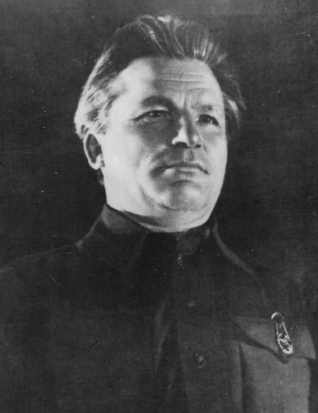 5
Sergei Mironovich Kirov was a Russian and Soviet politician and Bolshevik revolutionary.
5
Sergei Mironovich Kirov was a Russian and Soviet politician and Bolshevik revolutionary.
Dmitri Mendeleev
 5
Dmitri Ivanovich Mendeleev was a Russian chemist and inventor. He is best known for formulating the Periodic Law and creating a version of the periodic table of elements. He used the Periodic Law not...
5
Dmitri Ivanovich Mendeleev was a Russian chemist and inventor. He is best known for formulating the Periodic Law and creating a version of the periodic table of elements. He used the Periodic Law not...
Mirza Muhammad Haidar Dughlat
 3
Mirza Muhammad Haidar Dughlat Beg was a Chagatai Turco-Mongol military general, governor of Kashmir, and a historian. He was a Mughal Dughlat prince who wrote in both Chaghatai and Persian languages....
3
Mirza Muhammad Haidar Dughlat Beg was a Chagatai Turco-Mongol military general, governor of Kashmir, and a historian. He was a Mughal Dughlat prince who wrote in both Chaghatai and Persian languages....